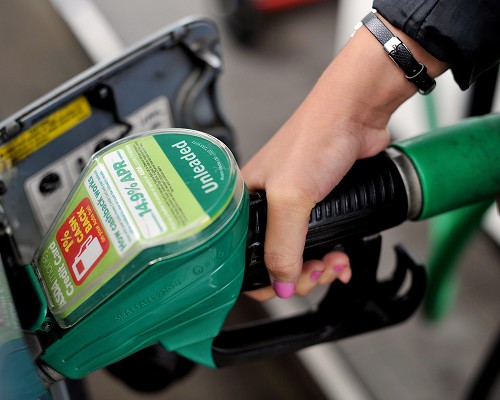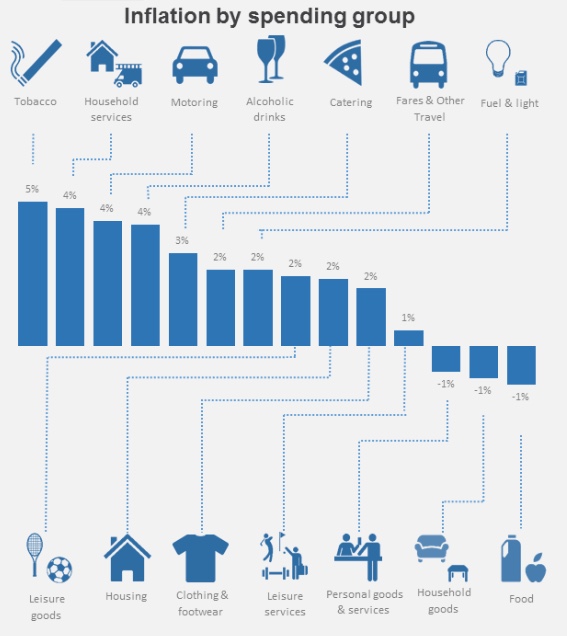
The effects of Brexit haven’t significantly affected retail prices in Jersey… for now, at least.
That’s the finding of the latest quarterly Retail Prices Index (RPI), released today by the States of Jersey Statistics Unit.
The report showed that the All Items RPI annual inflation rate – a measure of how quickly retail prices are going up or down – increased by 1.9% in the 12 months leading to December 2016.
It comes as a result, statistics show, of price increases in the majority of 14 key goods and services categories.
Increases in school fees and postal charges in September and April 2016 may have accounted for the 4% rise in household services costs, while diesel and petrol prices 7p higher than the previous year may have accounted for its 4% price push.
Islanders were forced to splash out on more highly-priced booze both in on-license and off-license premises, with an increase of 4%.

Pictured: The price of alcohol went up - both in and out of the pub.
Back at home, fuel and light prices made a minor jump of 2% due to a rise in cost of domestic heating oil, which was 3 pence per litre higher than the previous December.
But it was smokers who took the hardest hit, with tobacco prices taking a 5% leap – a likely consequence of increased impôts duties on cigarrettes of January 2016.
At the time, Treasury Minister Senator Alan Maclean said that, “…the cost of dealing with the effects of smoking far exceed the duty that is charged.”
“Based on UK per capita figures, the annual cost of smoking is estimated at just over £26m to the Island. The duty from tobacco was nearly £15m leaving an £11.5m shortfall for us to make up on general revenues. The overall burden that smoking places on our Island society is significant, make no mistake.”

Pictured: Treasury Minister Senator Alan Maclean had argued for a higher duty on tobacco.
Just three groups – ‘Household goods’, and ‘Personal goods and services’ and ‘food’ – saw prices decrease. But such savings were meagre at best, with all three groups diminishing by 1%.
Statistician Helen Boys commented: “Lower prices were seen for sweets and chocolates, sugar and preserves, some fresh meats, but the fresh vegetables, fish, lamb and tea and coffee – they all increased for the year. Put them altogether as an average, food fell by 1%.”
Despite these fluctuations, it was largely business as usual, with Jersey rates roughly following the UK pattern.
The bigger picture, however, is more revealing.
With the annual percentage changes for Jersey RPI on record from the year 2000, it’s now possible to understand how changes like the introduction of the competition law have affected the Island.
Jersey had previously seen consistently higher prices until 2005, when it started to fall in line with the UK RPIJ – the UK’s closest statistical equivalent.
“Things happened in 2005… the Competition Law came in, and Consumer Council started raising consumer rights as well, so there’s a coherence of awareness of competition in 2005,” Chief Statistician Duncan Gibaut explained.
“That’s very important because…people are looking to come over here, to live here, certainly to invest here. If Jersey’s seen by businesses and people to be more expensive, it doesn’t do you great for your business,” he added.
A small piece of good news for Senator Ozouf, he observed, who was “instrumental” in the law’s implementation.
Looking forwards, however, casts a murkier sight.
Island retail prices have not yet been dealt a blow from Brexit, and it remains unclear as to whether they will actually suffer at all or if this is a pre-Article 50 patch of calm.
Mr Gibaut maintains that, “It still is unclear what Brexit is going to mean.”
But issues that might factor into the next quarter’s results could include the depreciation of the pound relative to the euro or the dollar and fluctuating oil and petrol prices, which could lead to increased domestic heating bills, shocks at the petrol pump and even factor into the costs of goods distribution and processed items.

Pictured: Prices at the pump could be set to rise in the coming quarter.
“These oil price changes are starting to feed through… Crude oil prices came down, but they’ve essentially doubled from where they were a year ago. What was a $27 a barrelful is now $54,” Mr Gibaut said.
“The next round – March – is potentially interesting because, are going to see these potential oil effects or potential Brexit effects? But also in March, we’ll start including the latest round of impôts, [and] every March we start including the latest price increases that seem to happen because there’s been a change in calendar year.”
The results, he says, will be “fascinating” but “difficult to unpick.”
So are we in the calm before the storm? It will be hard to say, even after the next results emerge.

Pictured: Inflation affected 11 out of 14 key categories in the last quarter. (Graphic: States of Jersey Statistics Unit)
Comments
Comments on this story express the views of the commentator only, not Bailiwick Publishing. We are unable to guarantee the accuracy of any of those comments.